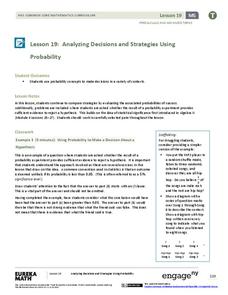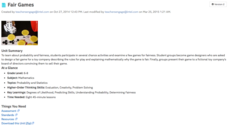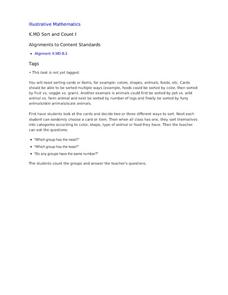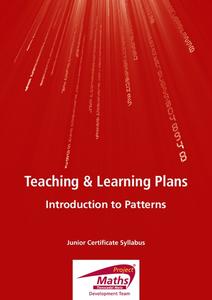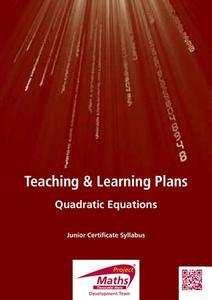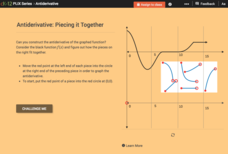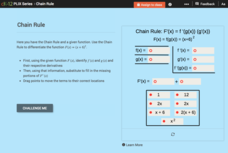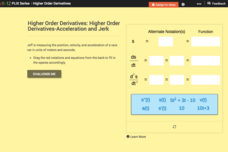EngageNY
Vectors and the Equation of a Line
Represent linear equations in both two and three dimensions using parametric equations. Learners write parametric equations for linear equations in both two and three variables. They graph and convert the parametric equations to...
EngageNY
Solving Equations Involving Linear Transformations of the Coordinate Plane
How can matrices help us solve linear systems? Learners explore this question as they apply their understanding of transformation matrices to linear systems. They discover the inverse matrix and use it to solve the matrix equation...
EngageNY
Solving General Systems of Linear Equations
Examine the usefulness of matrices when solving linear systems of higher dimensions. The lesson asks learners to write and solve systems of linear equations in four and five variables. Using matrices, pupils solve the systems and apply...
EngageNY
Matrix Addition Is Commutative
Explore properties of addition as they relate to matrices. Using graphical representations of vector matrices, scholars test the commutative and associative properties of addition. They determine if the properties are consistent for...
EngageNY
Base Angles of Isosceles Triangles
Build confidence in proofs by proving a known property. Pupils explore two approaches to proving base angles of isosceles triangles are congruent: transformations and SAS. They then apply their understanding of the proof to more complex...
EngageNY
Probability Distribution of a Discrete Random Variable
Learn how to analyze probability distributions. The sixth installment of a 21-part module teaches pupils to use probability distributions to determine the long-run behavior of a discrete random variable. They create graphs of probability...
EngageNY
Analyzing Decisions and Strategies Using Probability 2
Explore how to compare and analyze different strategies. In the 20th installment of a 21-part module, scholars continue their analysis of decisions and strategies from the previous lesson. They then extend this concept to hypothesis...
Intel
Fair Games
Who said things were fair? The unit introduces probability and its connection to fairness. The class interacts with activities of chance and plays games to relate them to fairness. Groups design a fair game and develop a presentation....
Scholastic
Adding and Subtracting Ten
Developing fluency with basic addition and subtraction is fundamental to the success of all young mathematicians. This four-day lesson series begins with learners using ten-frames and hundreds charts to recognize patterns when adding and...
Illustrative Mathematics
Which Weighs More? Which Weighs Less?
Expand the the comparative language of young mathematicians with a hand-on weight measurement activity. Working independently or in pairs, children compare the weight of large wooden blocks to various other classroom objects, recording...
Illustrative Mathematics
Sort and Count
Young mathematicians are on their feet and moving around in this primary grade sorting activity. After giving each child an object or picture card, they then sort themselves into groups, counting to see which has the most or least...
PBS
Adding Integers
Your sixth and seventh graders deepen their understanding of a number line and adding integers in this concrete, hands-on activity. Learners play "Warehouse Puzzle" and then discuss their game strategies and the characteristics...
Project Maths
Introduction to Trigonometry
The topic of trigonometric ratios is often covered with loads of rote memorization baked into the activity. This activity set, however, leans more on using similar triangles and discovery learning to help young geometers develop a deeper...
West Contra Costa Unified School District
Connecting Fractions and Rational Expressions
Teach class members to work with rational expressions using their knowledge of fractions. The lesson plan starts with a warm-up of rational expressions at four different levels of complexity. The different levels continue throughout...
Noyce Foundation
Double Down
Double the dog ears, double the fun. Five problems provide increasing challenges with non-linear growth. Topics include dog ears, family trees and population data, and geometric patterns.
Project Maths
Introduction to Patterns
The world is full of patterns. Help learners quantify those patterns with mathematical representations. The first Algebra lesson in a compilation of four uses a series of activities to build the concept of patterns using multiple...
Project Maths
Introduction to Quadratics
Develop conceptual knowledge of a quadratic equation and its solutions in your classes. The third algebra lesson in a series of four introduces learners to solving quadratic equations slowly. The first activity explores the zero product...
5280 Math
Stories That Formulas Tell
Learn the stories a formula holds. An interesting lesson takes a unique approach to teach how to use formulas. Beginning with a formula, learners predict what the variables stand for and then use the formula to make calculations and tell...
Voyage Solar System
Round and Round We Go — Exploring Orbits in the Solar System
Math and science come together in this cross-curricular astronomy lesson plan on planetary motion. Starting off with a hands-on activity that engages the class in exploring the geometry of circles and ellipses, this lesson...
Balanced Assessment
On Averages and Curves
Determine the average on a curve. The class finds graphical representations of averages and expresses them both symbolically and on the graph. The assessment requires class members to justify using average to describe graphs.
CK-12 Foundation
Antiderivative: Piecing it Together
Build a function backwards. Given a graph of the derivative of a function, pupils piece together a graph of the original function, the antiderivative. Learners use their graphs and the graphs of the derivatives to answer questions about...
CK-12 Foundation
Constant, Identity, and Power Rules: Power Rule
Learn to gain power in finding derivatives. The resource introduces the power rule. Using the sliders in the interactive, pupils create polynomial functions and find their derivatives. Given the derivative of a polynomial, learners...
CK-12 Foundation
Chain Rule
Keep it on the chains. Pupils work through the steps in the chain rule using the interactive as a guide. Learners identify the two composed functions and their associated derivatives from a set of choices. They continue on to build the...
CK-12 Foundation
Higher Order Derivatives—Acceleration and Jerk
Accelerate your class through finding the second derivative. Using a bank of equations, pupils determine the equations for distance, velocity, and acceleration and their associated function notations. With the equations, learners answer...








